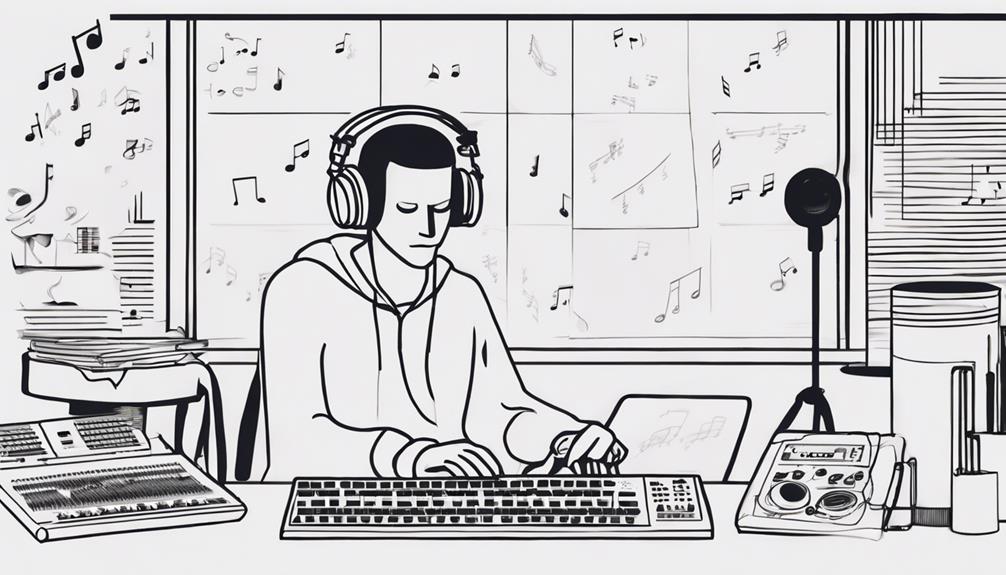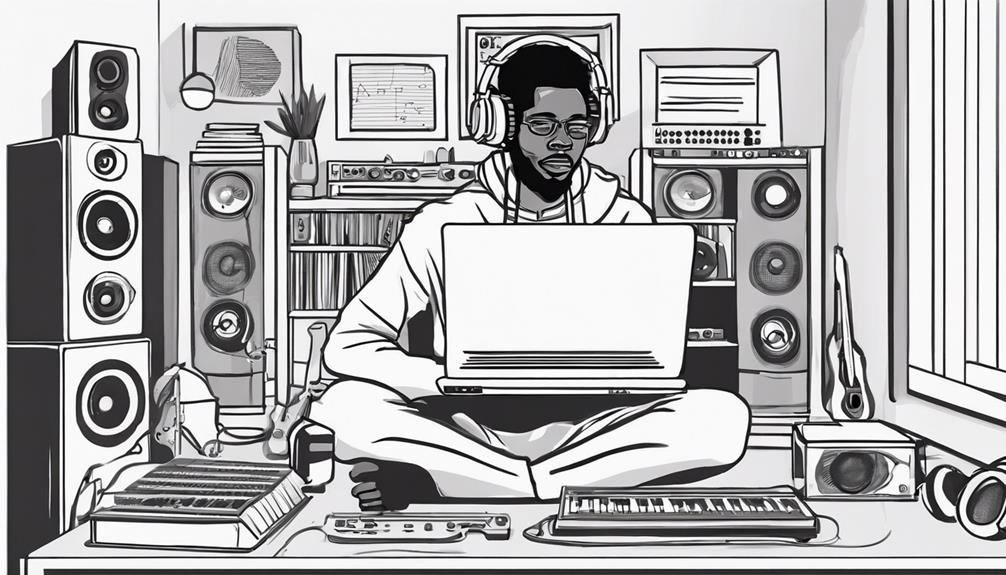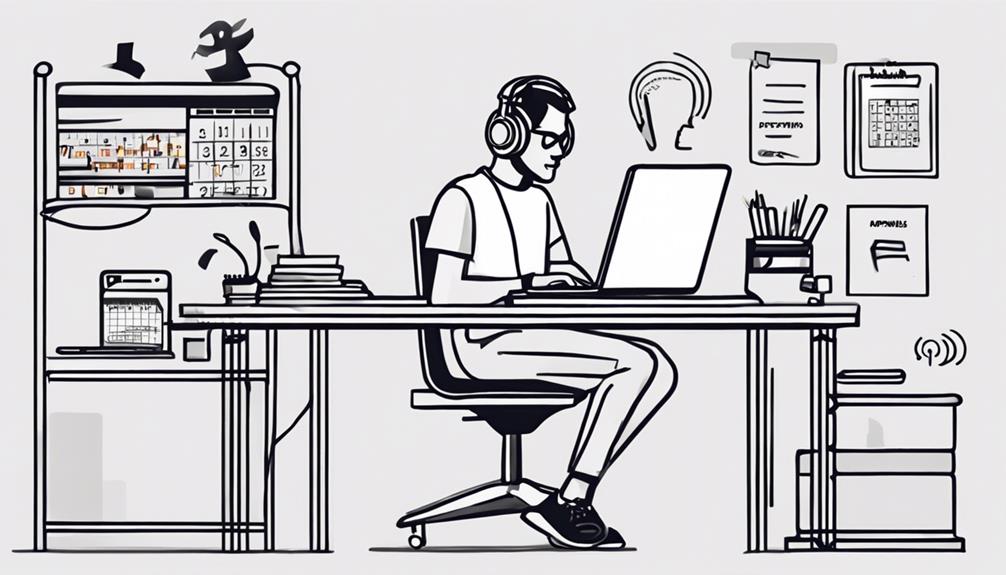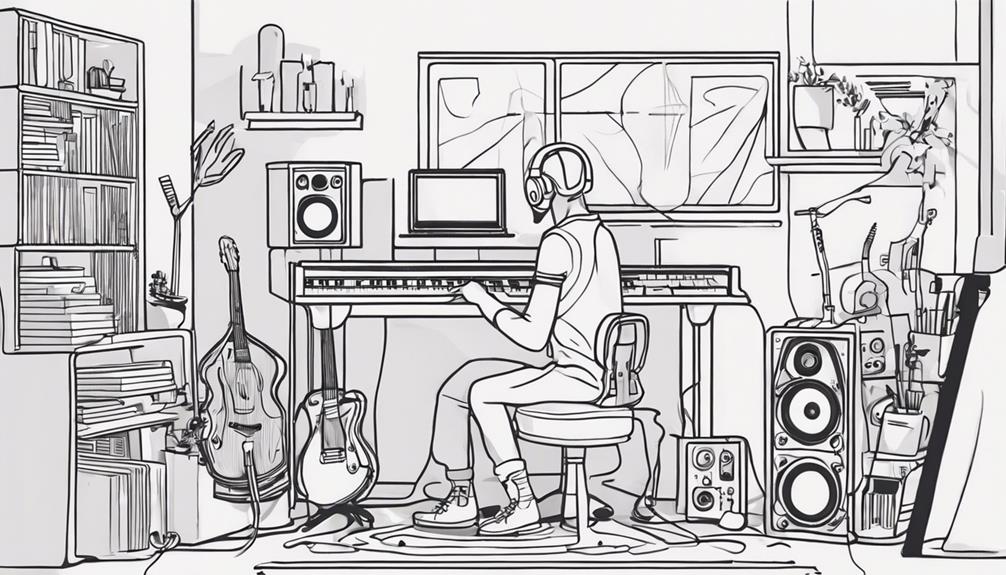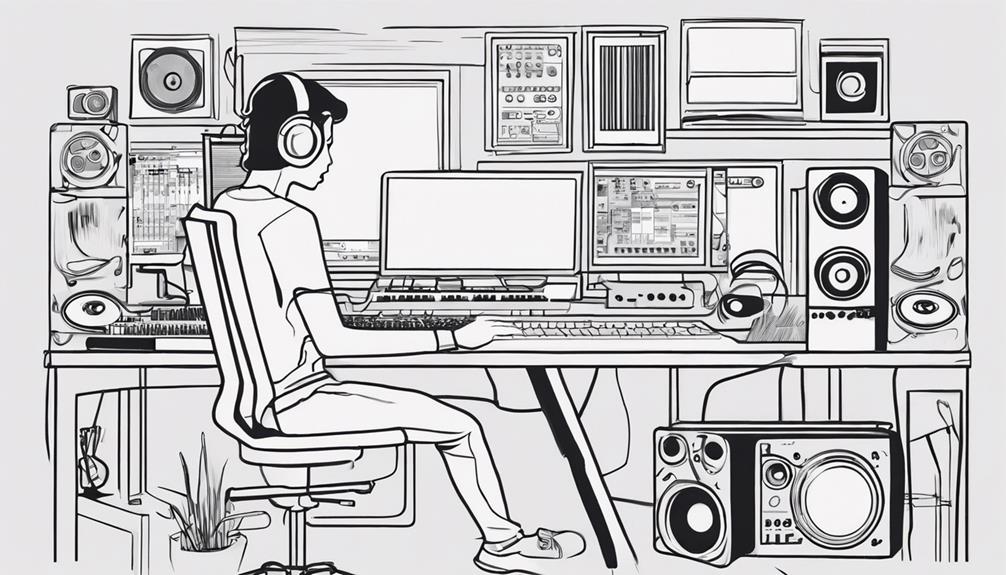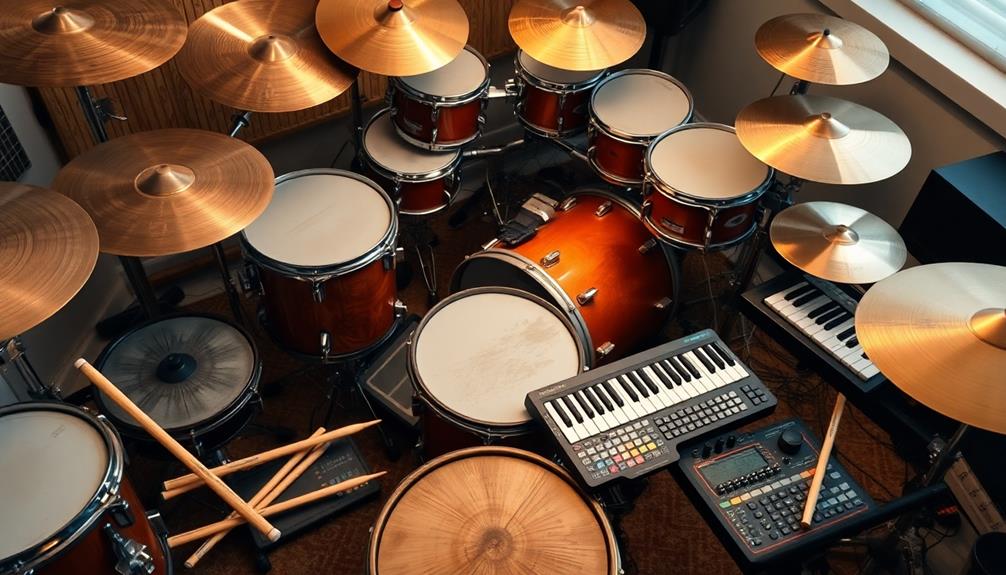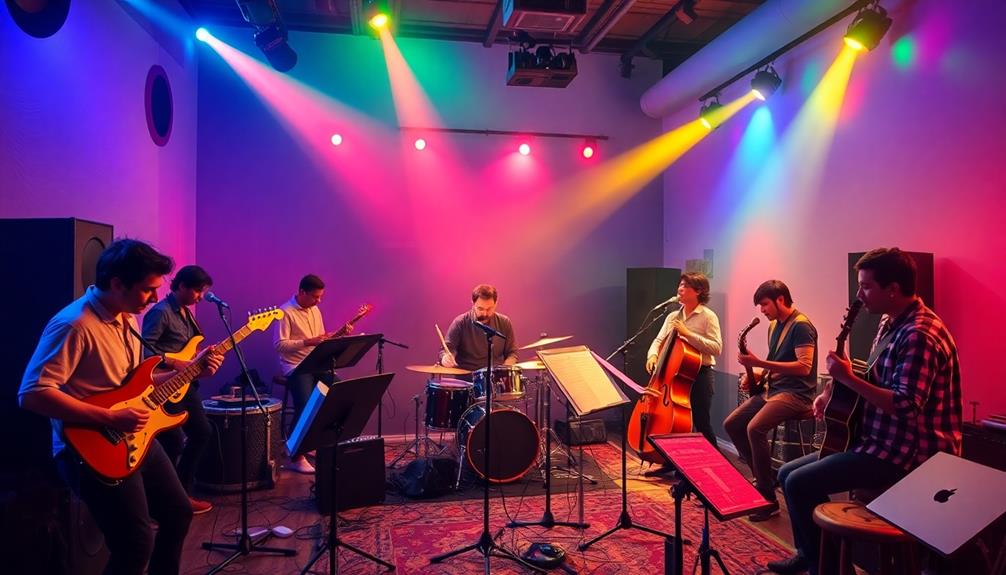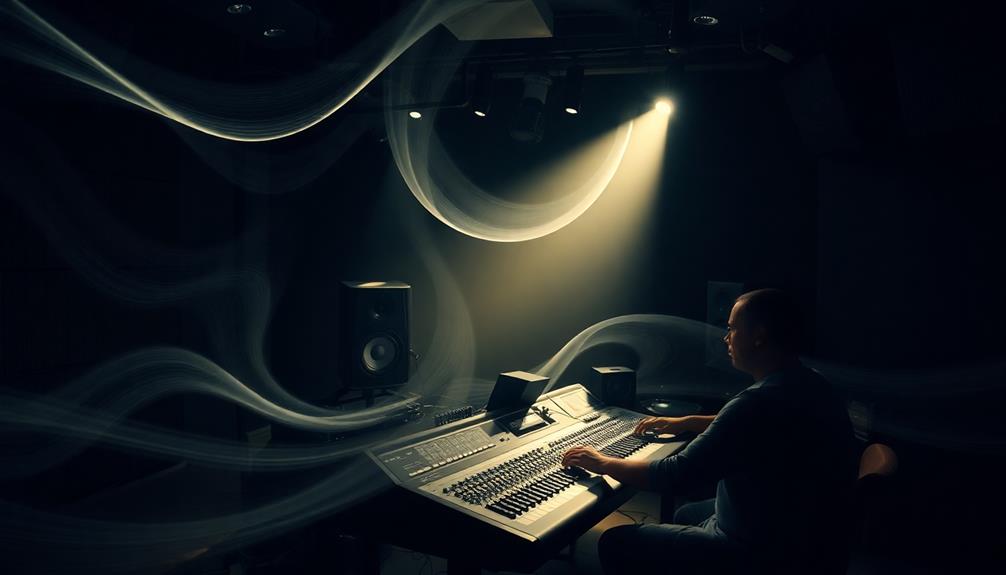Immerse yourself in music production by selecting a genre that resonates with you. Begin with grasping music theory and conducting gear research, such as digital audio workstations like Ableton Live. Establish a comfortable home studio space with essential tools and equipment. Learn the basics of DAW functions and hone your skills in creating beats, melodies, and harmonies. Experiment with blending genres to foster creativity. Engage with fellow producers for insights and feedback. Enhance your music production skills through consistent practice and trying out new techniques. Channel your creativity and kickstart the production of your unique tracks today!
Key Takeaways
- Choose a genre you love for motivation and foundation.
- Research and invest in essential gear and software.
- Create a dedicated, organized home studio space.
- Master basic DAW functions and music theory.
- Practice regularly, experiment with new techniques, and seek feedback.
Choosing Your Music Genre
When selecting your music genre for production, consider your personal musical tastes and interests. Learning music production involves understanding different genres and their unique characteristics. Music producers often start by focusing on genres that resonate with them, such as electronic music, to build a solid foundation in music production skills.
By immersing yourself in a specific genre, you can deepen your understanding of music theory and production techniques specific to that style.
To expand your creativity and versatility, explore blending genres to create innovative sounds. Experimenting with combining elements from different genres can lead to exciting and original music productions. However, it's crucial to first master one genre before delving into blending genres to secure a cohesive and polished production style.
Researching Gear and Software
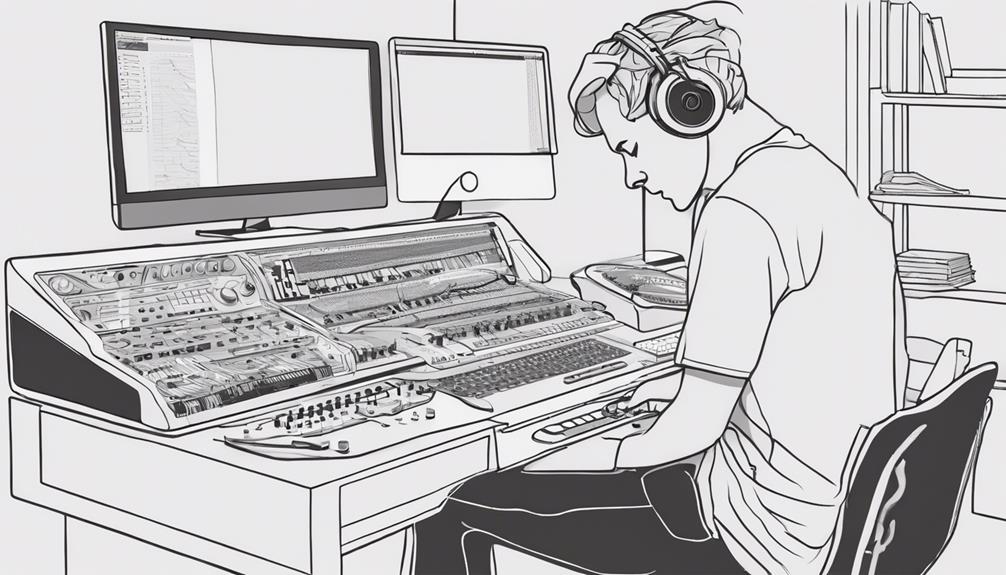
Begin your music production journey by thoroughly researching gear and software options to equip yourself with the necessary tools for creating high-quality music productions.
To make the most informed decisions, consider the following:
- Research different digital audio workstations (DAWs) such as Ableton Live, FL Studio, and Logic Pro X to find the best fit for your music production needs.
- Explore various software plugins like virtual instruments, effects, and synthesizers to enhance your music production capabilities.
- Look into essential gear like MIDI keyboards, audio interfaces, studio monitors, and microphones to create a functional home studio setup.
- Consider the hardware requirements of your chosen software to ensure smooth performance on your computer or laptop.
- Read reviews, watch tutorials, and join online forums to gather insights and recommendations on gear and software options for music production.
Setting Up Your Home Studio
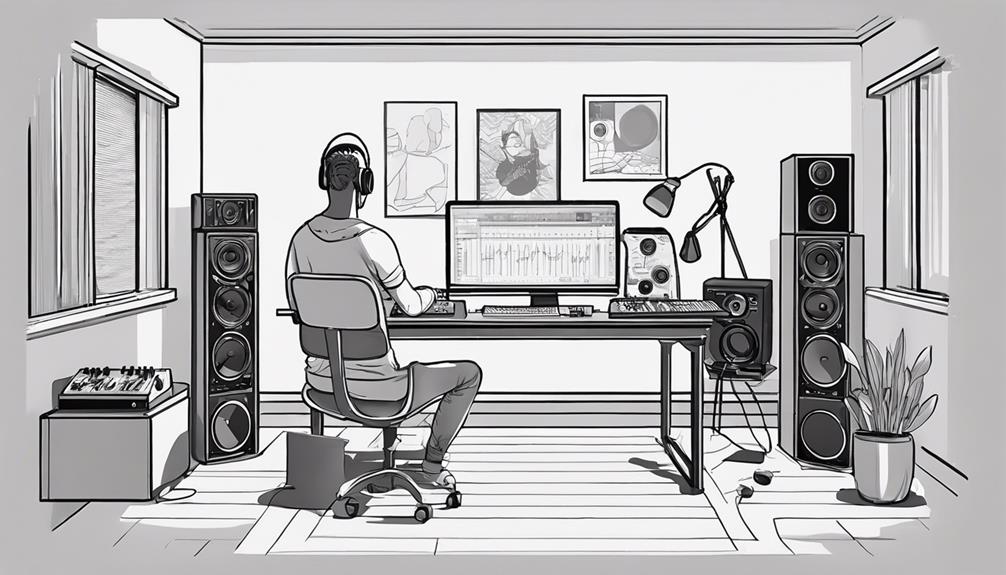
To establish your home studio effectively, make sure you have chosen a dedicated space in your home with minimal noise and good acoustics. This space will serve as the foundation for your music production journey.
Invest in key equipment such as a computer, digital audio workstation (DAW), studio monitors, and an audio interface to kickstart your setup.
Enhance the sound quality of your home studio by considering acoustic treatment options like soundproofing foam or bass traps.
Keep your workspace organized by neatly arranging cables and accessories, creating a clutter-free environment that fosters creativity.
Personalize your studio with inspiring decor, comfortable seating, and good lighting to cultivate a space that encourages productivity.
Mastering Basic DAW Functions
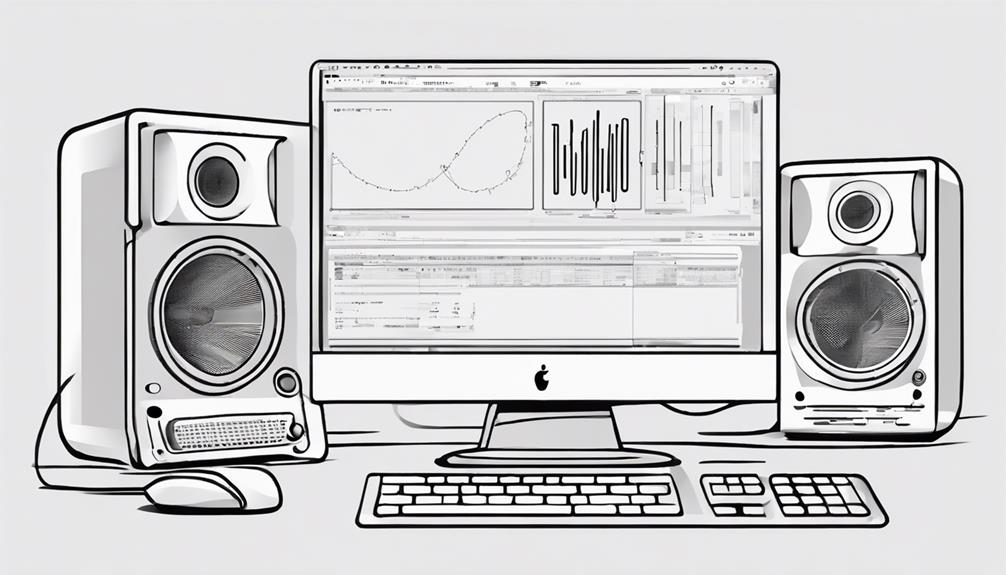
You should start by learning how to efficiently navigate the DAW interface for recording, editing, and arranging audio tracks.
Practice using essential tools like EQ, compression, and reverb to enhance the sound of your music.
Experiment with different settings to customize your workspace and optimize your music production workflow.
DAW Interface Navigation
Explore mastering basic DAW functions by familiarizing yourself with key interface elements like tracks, mixers, and plugins for efficient navigation.
To effectively navigate the DAW interface, remember these essential tips:
- Utilize basic tools: Get comfortable with recording, editing, and arranging functions to kickstart your music production journey.
- Leverage shortcuts and hotkeys: Speed up your workflow and boost productivity by learning essential keyboard shortcuts.
- Organize tracks effectively: Label and arrange your tracks systematically for a more streamlined workflow.
- Immerse yourself in automation features: Immerse yourself in automation to add dynamic control and expression to your music productions.
- Refer to tutorials: Take advantage of tutorials and guides tailored to your specific DAW to master its unique interface and functionalities swiftly.
Audio Editing Techniques
Mastering basic DAW functions involves familiarizing yourself with key audio editing techniques such as cutting, copying, pasting, and adjusting audio levels within the software interface.
To excel in audio editing, grasp track arrangement to organize your project effectively. Utilize mixing controls to blend different elements seamlessly.
Interface navigation is essential; learn how to import audio files and place them on the timeline for editing. Practice basic editing techniques like trimming audio clips, moving them around, and adjusting their volume levels.
Experiment with effects and plugins such as EQ, compression, and reverb to enhance the sound quality of your tracks. Additionally, master automation features to create dynamic changes in volume, effects, and other parameters over time.
Practicing Music Creation
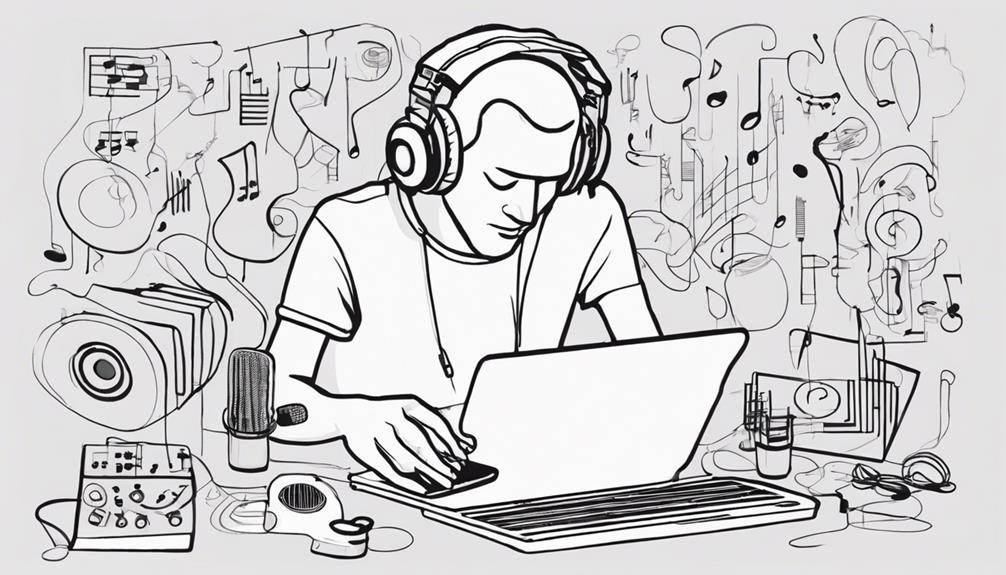
Engage in regular practice sessions to hone your music creation skills using your preferred DAW. Experiment with different musical elements like beats, melodies, and harmonies to enhance your music production abilities.
Challenge yourself by exploring new techniques and delving into various genres to boost your creativity.
Take advantage of online resources, tutorials, and courses to learn more about music production techniques and concepts. Seek feedback from peers or online communities to improve your music creations and receive constructive criticism.
- Experiment with diverse musical elements.
- Challenge yourself to try new techniques.
- Explore various genres to expand your creativity.
- Utilize online resources for learning.
- Seek constructive criticism for improvement.
Networking With Producers
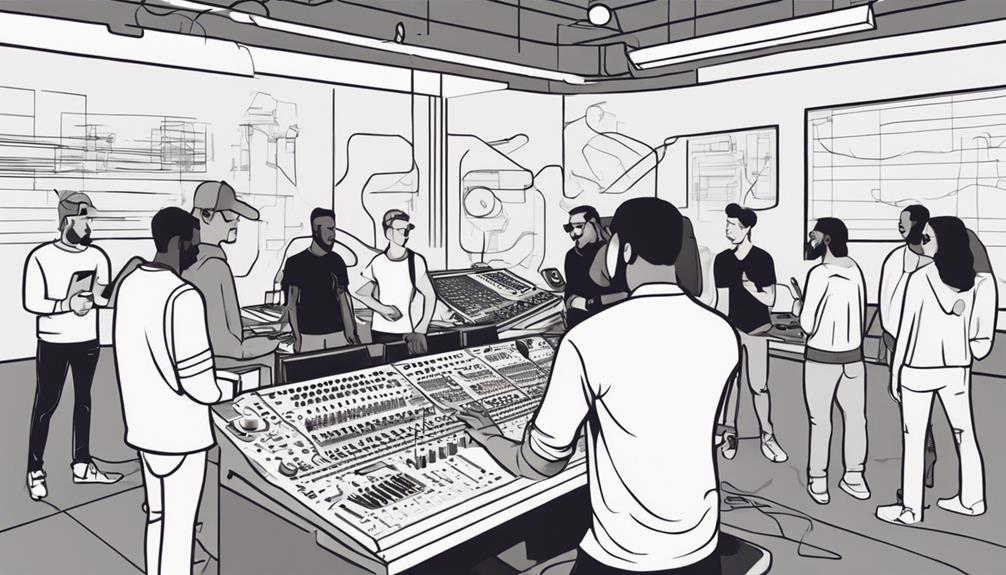
Connecting with fellow producers is essential for expanding your network and gaining valuable insights in the music production industry. To start networking with producers, consider joining online forums and social media groups dedicated to music production. These platforms provide opportunities to engage with like-minded individuals, share experiences, and even find collaboration opportunities.
Attending industry events is another effective way to meet established producers, opening doors to mentorship and career growth in music production. Engaging with other producers by sharing your work, providing feedback, and learning new techniques can help you stay inspired and continually improve your craft.
Collaborating on projects with fellow producers not only enhances your skills and creativity but also expands your network within the music production community. Remember, building relationships with other producers is a two-way street – be open to sharing your knowledge and experiences while being receptive to learning from others in this ever-evolving industry.
Frequently Asked Questions
Can I Self Teach Myself Music Production?
Yes, you can absolutely teach yourself music production! With dedication, practice, and online resources like tutorials and forums, you can develop your skills. Stay motivated, practice consistently, and embrace the learning process.
How to Learn Music Production Step by Step?
Start by immersing yourself in music production basics. Experiment with various DAWs, create beats, and seek feedback. Engage with online resources for tutorials and courses. Regular practice and a willingness to learn from errors are key to mastering music production. Stay curious and explore different genres to broaden your creative horizons and discover what resonates with your style. Once you gain confidence in your skills, consider sharing your knowledge and perspectives—perhaps even make a music production tutorial to help others who are just starting out. This not only reinforces your understanding but also helps you connect with a community of like-minded creators. As you progress, don’t hesitate to collaborate with other musicians and producers to enhance your skill set and gain new insights. Sharing your experiences and workflows can inspire others and deepen your connection within the music community. You might even take the opportunity to make a music production tutorial, offering tips and techniques that have worked for you while contributing to the collective growth of aspiring producers.
How Do I Start Myself as a Music Producer?
Start by choosing a specific music genre to focus on. Research and invest in essential equipment like a computer and DAW software. Experiment with basic functions. Join music production communities, set goals, practice, and seek feedback for improvement.
What Is the Best Way to Learn Audio Production?
Dive deep into the sonic seas, exploring various digital shores with DAWs like Ableton Live, Logic Pro, or FL Studio. Ride the waves of online tutorials, joining producer crews to navigate the audio production voyage with skill and flair.
Conclusion
By immersing yourself in these steps, you can explore the world of music production and create your own unique sound.
Just remember, Rome wasn't built in a day, so don't be afraid to experiment and make mistakes along the way.
Think of your music production journey as a blank canvas waiting to be filled with your creativity and passion.
Keep pushing forward and watch your skills grow like a beautiful melody.

